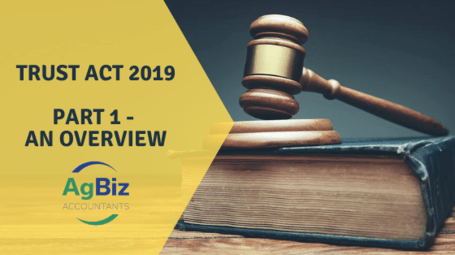Accountants have received guidance about the new Trust Act 2019. This new law (the first in more than 60 years) will affect everyone who is involved with a Trust. The new trust law will be effective from 31 January 2021 and includes clarification of the existing trust laws and some significant changes.
Many clients have trusts and are also trustees of trusts. However, some trustees may not be aware of their role and duties as a trustee, recording keeping and disclosure requirements. If you have a Family Trust or are involved in a Trust in some way, you must make yourself familiar with the provisions of the Act and ensure your Trust is compliant. We can help you with this.
As we approach 31 January 2021, we will release a series of articles and contact clients involved with Trusts. We realise that some of this new information may seem technical however it is important.
Please contact us now if you would like to discuss the purpose of your Trust with us, ensure it meets your needs moving forward (in conjunction with these new changes) and how the new changes may affect you.
In our series of articles:
Part 1 (below) outlines they key overview of the new Act including: trustees duties, retention of information, disclosure of information to beneficiaries, exemption and indemnity clauses, appointment and removal of trustees, lifetime of a trust, definition of a minor, disputes resolution and anti-money laundering and countering financing of terrorism implications.
Part 2 will outline what you can do to prepare
Part 3 outlines how we can help you
Overview of the New Act:
A particular purpose of the new Act is to enhance trustee accountability and to give beneficiaries broader ability to have trustee decisions reviewed. The new legislation will apply to all family trusts and the Commission’s review highlights to us the important of our clients having good administration and management of their trusts.
The key overview of the new Act is outlined below:
Trustee Duties: The Act provides for both mandatory and default trustees duties. Mandatory duties cannot be modified or excluded by the Trust Deed; Default duties can be. Any modifications or exclusions must be documented in the Trust Deed. We have outlined the differences between mandatory duties and default duties in the table further below.
Retention of information: Trustees are required to retain core Trust documents. Core Trust documents include the Trust Deed and any variations, minutes, financial statements, and any other documents necessary for the administration of the Trust. This also includes any property sale and purchase agreements, solicitors’ settlements statements, proof of trust investments etc.
Disclosure of information to beneficiaries: The Act makes the presumption that Trustees must make ‘basic Trust information’ available to all beneficiaries and consider making ‘other Trust information’ available to beneficiaries upon their request. The Act sets out certain factors which the Trustee must consider before providing information that has been requested beyond ‘basic Trust information’. In the past, beneficiaries may not have been aware that they were set to benefit from trust distributions. There is likely to be a cost involved in complying with this additional disclosure requirement.
Exemption and indemnity clauses: Trust Deeds must not limit a Trustee’s liability or provide an indemnity for dishonesty, wilful misconduct, or gross negligence.
Appointment and removal of Trustees: Statutory powers for the appointment and removal of Trustees have been modernised and broadened to minimise the need to apply to the court.
Lifetime of a Trust: Trusts can now have a lifetime of up to 125 years, subject to the terms of the Trust. Previously, this was limited to 80 years, so your Trust Deed may need to be updated.
Definition of a minor: The age of minority has been reduced from 20 to 18 years old.
Disputes resolution: An alternative disputes resolution process is set out in the Act to allow for mediation and arbitration.
Anti-money Laundering and Countering Financing of Terrorism Act (AML/CFT).
While not specifically outlined in the new trust Act, accounting firms are required to conduct a higher level of due diligence (enhanced due diligence) for each trust. This includes verifying the source of wealth or source of funds. We will be requesting all trusts to provide documentation to support the source of your trust’s wealth and funds, the identity and address of trustees and settlors and other information that may be required under the AML/CFT Act.
Although, there is increased level of disclosure and trustee obligations, the trusts are still a valid structure to use for asset protection and investment structure.

Contact Us
Please contact us if you would like to discuss the purpose of your Trust with us, ensure it meets your needs moving forward (in conjunction with these new changes) and how the new changes may affect you. We are happy to help. We have also published more information about:
Part 2: What you need to do now, to prepare for the new Act
Part 3: How we can help you
Contact Tim Doyle or Jane Evans today to discuss your business continuity planning needs on 07 823 4980 or contact us. Our office is in Cambridge, NZ, but distance is no problem. We have many international and national clients.
This material has been prepared for informational purposes only, and is not intended to provide, and should not be relied on for, tax, legal or accounting advice. You should consult your own tax, legal and accounting advisors before engaging in any transaction.





